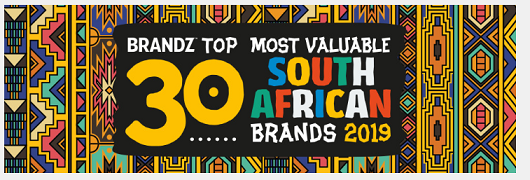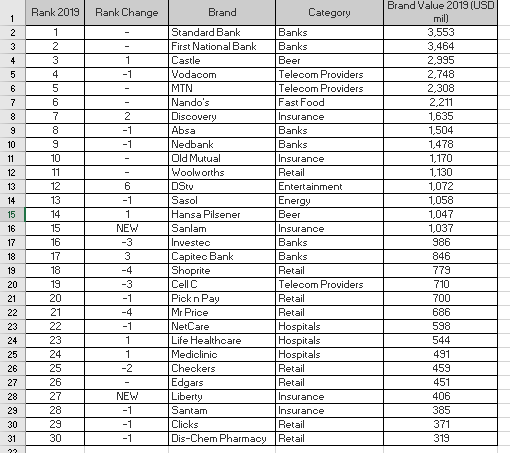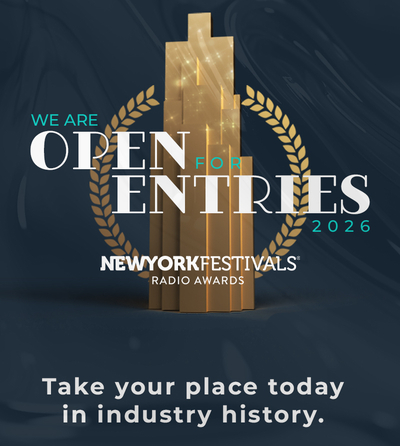 The combined value of the brands in the BrandZ™ Top 30 Most Valuable South African Brands ranking, released today by WPP and Kantar and now in its second year, is $37.14 billion.
The combined value of the brands in the BrandZ™ Top 30 Most Valuable South African Brands ranking, released today by WPP and Kantar and now in its second year, is $37.14 billion.
The challenging macroeconomic and political environment resulted in a 13% drop in value from 2018, but brand resilience saw the country’s Top 30 brands outperform the Johannesburg Stock Exchange (JSE) Top40 Index which fell 20% in dollar terms during the valuation period. Furthermore, analysing the total brand value of the ranking in relation to the South African economy (GDP) shows the top brands to be in relatively good health, with a ratio on a par with or stronger than many other countries with larger GDPs.
The BrandZ study, which is the only brand valuation ranking to combine company financial data with consumer insight and opinion, reinforces the importance of strong brands. While not immune to difficult circumstances, strong brands are protected from the worst macroeconomic effects and are positioned for a fast return to growth when conditions improve. This is key as South Africa adopts an increasingly more positive outlook following the 2018 change in government.
Standard Bank remains at No. 1 with a brand value of $3.55 billion but No. 2 brand, First National Bank (FNB), closes the gap with a value of $3.46 billion, having continued to invest in customer-focused digital innovation and strong communications. Meanwhile, an 11% increase in value to $846 million saw Capitec Bank (one of only three brands whose value went up) rise three places to No. 17. From its origins as a micro-lender to offering banking services to those unable to bank elsewhere, it now attracts customers across the wider socio-economic strata and continues to innovate, including launching a credit card. With an overall value of $11.83 billion, the banking sector retains its pole position in the ranking.
The fastest riser in the BrandZ 2019 ranking is entertainment brand DStv which increased its value by 38% to $1.07 billion (in part due to DStv’s parent company Multichoice now being listed on the JSE) to rise six places up the ranking to No. 18. By carefully curating content for local audiences, alongside initiatives such as working with South African filmmakers – many of whom are from under-privileged backgrounds, DStv has established itself as a key contributor in creating an exciting, meaningful and sustainable video entertainment industry.
The expanded scope of the research covering life insurance for the second year saw two newcomers to the Top 30. Sanlam, valued at $1.04 billion, is No. 15 and Liberty is No. 27 with a value of $406 million.
Difference has proven to be an important factor for South African consumers. As demonstrated by the banks category, innovative brands that were able to demonstrate their uniqueness were more robust; brands seen to have distinct attributes were 13% better off than those that did not.
With its ability to encapsulate the national psyche, fast food brand Nando’s celebrates its difference. The third brand to make the fastest risers category, it increased 2% to $2.21 billion, to keep it in the No. 6 slot for the second year.
Comments
Ivan Moroke, CEO at South Africa Kantar, Insights Division, says: “Brands that have dared to be different have continued to innovate and dedicated themselves to really understanding the South African consumer – particularly during more challenging economic times when people are conscious of what they’re spending. These brands are well-placed for future growth as we begin to see green shoots and increased optimism within the South African economy.”
David Roth, CEO of The Store WPP EMEA and Asia and Chairman of BrandZ, says:
“Brands can’t control their external environment, but they can strengthen their business and prepare for the future through investment that allows them to respond to the market and consumers’ evolving needs. This is very clear in South Africa where the success stories are brands demonstrating significant resilience in the face of extreme economic pressure.”
Key trends
Expanding ecosystems: Discovery, which started life as a medical aid company, continues to grow its brand ecosystem. Rising two places to No. 7 with a brand value of $1.64 billion, it shook up the banking sector with the launch of its ‘behavioural banking’ service that encourages consumers to adopt a healthier approach to their finances. Further disruption to the sector is evident outside the Top 30 with the opening of four new digital-only banks.
Differentiation: South African beer brands held their own in the ranking despite several premium global offerings with significant advertising budgets entering the market as a result of the change of ownership of South African Breweries. Overall the category value is $4.04 billion (a drop of only 6% from 2018) as beers successfully differentiated themselves from the competition and cultivated loyalty, while Castle rose one place to the No. 3 slot with a value of $3.00 billion (a figure that includes its Castle Lite and Castle Milk Stout products).
Standing for something: South Africa ranks highly on being socially aware and using this to make a difference, with only four other countries scoring higher in this respect. In contrast to other regions where there can be a disconnect between what brands say and what they do, a lot of South African brands adoptthe local philosophy of ‘ubuntu’ – an emphasis on helping others, and take part in various calls for social and economic justice.
Beyond the country borders: Only a few South African brands have a presence outside the country and this is potentially a missed opportunity; South Africa itself scores highly on measures of difference in WPP’s BAV Group’s Best Countries report, indicating that people around the world are open to brands from the region.
Beyond the ranking: Several brands fall outside the Top 30, but are highly regarded by consumers and recognised in BrandZ South Africa’s awards. These include food brand KOO, which is the most loved by consumers (scoring 136 on this index, where the average is 100), mobile data provider, Rain, which scored 120 for innovation (against an average of 100) and ecommerce company Takealot, which wins on brand experience with a score of 121 against the average of 100.



